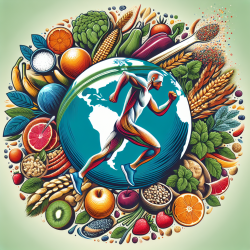The intersection of nutrition and sustainability is becoming increasingly important in the world of sports and exercise. As practitioners, it is crucial to understand how dietary choices impact not only individual health but also the environment. The concept paper "Eat as If You Could Save the Planet and Win!" provides valuable insights into integrating sustainability into nutrition for athletes and active individuals.
The Environmental Impact of Food
Food production significantly contributes to environmental degradation. Agriculture uses a substantial amount of land, water, and energy, making it a major contributor to resource depletion and greenhouse gas emissions. Animal agriculture, in particular, plays a significant role in these impacts due to the high demand for meat production.
Practitioners can help mitigate these effects by promoting dietary changes that reduce the consumption of animal-based foods and increase plant-based alternatives. This not only benefits the environment but also aligns with health recommendations for reducing chronic diseases associated with high meat consumption.
Sustainability in Sports Nutrition
Athletes often have higher energy and protein requirements, which traditionally leads to increased consumption of animal products. However, there are numerous opportunities to incorporate sustainable practices into sports nutrition:
- Reduce Meat Consumption: Encourage athletes to consume less meat, particularly red and processed meats. Replacing some animal proteins with plant-based sources can significantly reduce environmental impacts.
- Diversify Protein Sources: Introduce athletes to alternative protein sources such as legumes, nuts, seeds, and even insects. These options provide essential nutrients while having a lower environmental footprint.
- Focus on Food Quality: Promote the consumption of organic and locally sourced foods. These options often have higher nutrient densities and lower environmental impacts compared to conventionally produced foods.
Cultivating Food Literacy
An essential aspect of integrating sustainability into sports nutrition is enhancing food literacy among athletes. This involves educating them about where their food comes from, how it is produced, and its impact on both personal health and the environment. Practical strategies include:
- Taste Education: Organize tasting events to introduce athletes to a variety of plant-based foods and flavors.
- Culinary Skills: Encourage cooking classes that focus on preparing sustainable meals using local ingredients.
- Sustainable Practices: Teach athletes about reducing food waste through proper planning and storage techniques.
The Role of Practitioners
As practitioners, you play a pivotal role in guiding athletes towards more sustainable eating habits. By incorporating these principles into your practice, you can help athletes achieve optimal performance while contributing to environmental conservation. Encourage them to embrace small changes that collectively make a significant impact.
The integration of sustainability into sports nutrition is not just about reducing environmental impacts; it's about fostering a holistic approach to health that benefits both individuals and the planet. By adopting these practices, we can create a healthier future for all.










